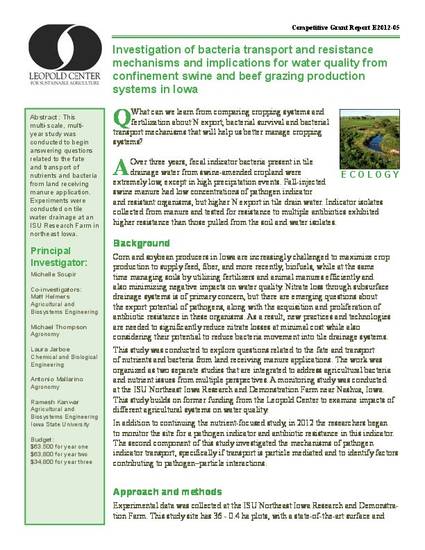
Unpublished Paper
Investigation of bacteria transport and resistance mechanisms and implications for water quality from confinement swine and beef grazing production systems in Iowa
Leopold Center Completed Grant Reports
Project ID
E2012-05
Abstract
This multi-scale, multi-year study was conducted to begin answering questions related to the fate and transport of nutrients and bacteria from land receiving manure application. Experiments were conducted on tile water drainage at an ISU Research Farm in northeast Iowa.
Key Question
What can we learn from comparing cropping systems and fertilization about N export, bacterial survival and bacterial transport mechanisms that will help us better manage cropping systems?
Findings
Over three years, fecal indicator bacteria present in tile drainage water from swine-amended cropland were extremely low, except in high precipitation events. Fall-injected swine manure had low concentrations of pathogen indicator and resistant organisms, but higher N export in tile drain water. Indicator isolates collected from manure and tested for resistance to multiple antibiotics exhibited higher resistance than those pulled from the soil and water isolates.
Principal Investigator(s)
Michelle Soupir
Co-Investigator(s)
Matt Helmers, Michael Thompson, Laura Jarboe, Antonio Mallarino, Ramesh Kanwar
Year of Grant Completion
2015
Disciplines
Citation Information
Michelle Soupir, Matt Helmers, Michael L. Thompson, Laura R. Jarboe, et al.. "Investigation of bacteria transport and resistance mechanisms and implications for water quality from confinement swine and beef grazing production systems in Iowa" (2015) Available at: http://works.bepress.com/michelle_soupir/39/
